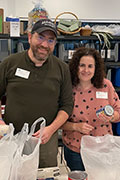'The Solutions Just Clicked'

Bonnie Berger ’83 (Photo credit: Allegra Boverman)
Part of Exceptional Results
Mathematician Bonnie Berger ’83 says her lightbulb moment came during her sophomore year.
She was sitting at a computer terminal in Ford Hall, coding in FORTRAN, one of the earliest programming languages. “It just came so easily to me,” she says. “I thought, ‘Aha! I’ve found what I love.’”
Berger, the Simons Professor of Mathematics at MIT, and a member of both the National Academy of Sciences and the American Academy of Arts and Sciences, is one of the world’s foremost experts in computational biology, the application of computer science and math to biology.
She’s used code-breaking strategies to reveal protein structures, applied machine learning and big data to drug discovery, and invented a computational tool called Dig that identifies genetic mutations in cancer cells before they turn tumorous. “I view biology as providing me problems as a mathematician,” she says.
Her father, a Miami businessman who dreamed of being a mathematician, used to slip notes under her bedroom door that read, “Good morning, Bonnie! Would you like to do math problems today?”
She started Brandeis as a Russian language major, then switched to psychology during her second year. She didn’t have much interest in diagnosing mental illness or analyzing graffiti on a bathroom wall (an observational experiment assigned in one class), but she did love any assignment involving programming. In her junior year, she changed her major to computer science.
“I could see how to lay out a program,” she says. “The solutions just clicked in my brain.”
She got 11 A-pluses in her math and computer science classes. One summer, she designed the university’s first online course-registration system for the registrar’s office.
Although there weren’t many female faculty or students in the computer science department at the time, Berger says she never encountered sexism.
“I was appreciated for my brain,” she says. “There were never any issues with gender.” And faculty members encouraged her to pursue an advanced degree after graduation.
“Brandeis helped me find myself,” she says. “It finds hidden jewels.”
